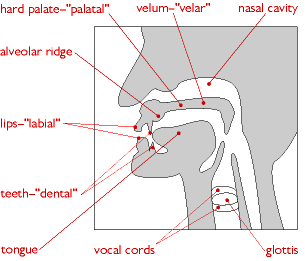| Sound Terminology | Close this window |
Parsings/etymologies of articulatory terminology for English consonants. Most of the following terms come from Latin. The exceptions are glottal, glottis which are based on a Greek root.

Places of articulation
| bilabial |
|
'produced with the two lips' |
| interdental |
|
'produced with tongue between the teeth' |
| alveolar |
|
'produced at the alveolus, i.e. the alveolar ridge' (so called because it abuts on the tooth sockets, or alveoli 'little hollows') |
|
'produced starting at the alveolar ridge then immediately afterwards at the palate' ( alveol is from alveol-us, the diminutive form of alveus 'a cavity, hollow') | |
| palatal |
|
'produced at the palate' (palate has an uncertain etymology; possibly Latin borrowed it from Etruscan) |
| velar |
|
'produced at the velum, or soft palate' |
| glottal |
|
'produced at the glottis' (the vocal chord part of tongue, the upper larynx) |
Manners of articulation
The adjective endings -ive and -al below are in these articulatory terms being used as noun endings, via leaving out the nouns they modify (e.g. 'plosive sounds' > 'plosives' etc.) We can think of this as a zero-derivation of nouns from adjectives. I gloss them here as adjective endings because that is their primary use and these terms are still easily used as adjectives.
| stop |
|
'sound produced with total stoppage of airflow in the mouth' same as: |
| plosive |
|
(see above) |
| fricative |
|
'sound produced with partial occlusion of vocal tract, producing audible friction' (e.g. /f/, /s/) |
|
'sound produced by stopping airflow and then partial release into a fricative at or near same point of articulation' (e.g. /ch/) | |
| nasal |
|
'sound produced by stopping airflow in mouth, but allowing it to continue flowing through nasal tract' |
| liquid |
|
'/l/ and /r/ sounds' (so called because they give acoustic impression sounding like water flowing) |
| lateral |
|
'sound produced by touching tongue to roof of mouth and letting air pass at one or both sides of the tongue' (/l/ is the only lateral in English) |
| approximant |
|
'consonant produced with relatively wide opening between articulators; an in-between sound that approximates or comes near to a vowel sound' (/y/ and /w/ are the main English approximants; sometimes /l/ is called a lateral approximant) |